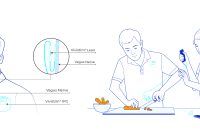- The world’s smallest pediatric treatments, developed by Abbott, meet the needs of the most vulnerable patients: babies and children born with congenital heart defects
- Approval includes use of a pediatric mechanical heart valve and the first minimally invasive device to treat premature and newborn babies with an opening in the heart
SÃO PAULO, February 23, 2021 / PRNewswire / – Abbott (NYSE: ABT ) announces that it has received approval from Anvisa (National Health Surveillance Agency) for the use of two of its pediatric life-saving devices. The 15 mm Masters HP ™ rotary mechanical heart valve and Amplatzer Piccolo ™ Occluder are already available throughout Brazil. The new treatments, already available in the US, Canada and Europe, offer hope to pediatric patients and their families when there is no other suitable treatment option.
Congenital heart diseases affect approximately 28,900 live births per year in Brazil (1 in 100 live births suffer from some type of anomaly) 1 . The Masters HP valve is the smallest mechanical heart valve in the world and allows doctors to treat babies and children who need a mitral heart valve replacement. The Amplatzer Piccolo is smaller than a pea and the first medical device in the world that can be implanted in smaller babies (weighing more than 700 grams) to treat Arterial Canal Persistence, or PCA, a potentially life-threatening opening in the heart . These life-saving devices for certain congenital heart defects are the first and only devices in the world.
“Devices like these are the best example of how Abbott can deliver on its promise to help people, in this case babies and children, as these treatments are nothing short of exceptional,” says Andre Fontes , Country Manager of the Structural Heart Disease business at Abbott in Brazil. “While children who benefit from these therapies represent a very small portion of the population with heart problems, advanced technologies like these allow doctors to treat vulnerable pediatric patients who would otherwise have only very limited treatment options.”
About Masters HP 15mm, rotary mechanical heart valve
Smaller than a 10-cent coin, only 15 mm, the Masters HP valve is the first and only pediatric mechanical heart valve developed for babies and newborns in Brazil.
The double leaflet rotary mechanical heart valve was designed for implantation in the mitral position and is part of the Masters Series line. When the heart valve tissues have a significant malformation or are severely damaged and cannot be repaired to function properly, it may be necessary to replace it with a mechanical valve. A mechanical heart valve mimics a healthy heart valve, opening and closing with each heartbeat, allowing adequate blood flow through the heart.
Prior to the Abbott device, surgeons could only use larger heart valves to replace a pediatric valve, which could result in improper fitting and complications for the patient.
About the Amplatzer Piccolo Occluder
Arterial Canal Persistence, also known as PCA, is one of the most common congenital heart defects in premature babies, when there is a potentially fatal opening between two blood vessels that depart from the heart. This channel, which is present in normally developing fetuses, is important before birth to allow the mother’s oxygen-rich blood to circulate throughout the fetus’ body. For most babies, the pathway (or duct) closes shortly after birth. In some cases, however, especially in premature babies, the PCA does not close spontaneously, which can hamper the baby’s normal breathing due to increased blood flow to the lungs. PCA is responsible for up to 10% of all congenital heart diseases 2 .
The Amplatzer Piccolo, recently approved in Brazil, is a self-expanding wire mesh device that is inserted through a small incision in the leg and guided through vessels to the heart, where it is placed to seal the opening in the heart. Many premature babies who are critically ill in Neonatal ICUs can be removed from the support of an artificial respirator right after the minimally invasive procedure. With the approval of the Amplatzer Piccolo in Brazil, Abbott offers hope to the families of these premature and newborn babies who need corrective treatment or may not respond to medical treatment and are at high risk of undergoing corrective surgery.
The Amplatzer Piccolo device builds on over 20 years of clinical success for Abbott’s Amplatzer Occluder line of therapies, including Amplatzer Channel Occlusion Device (ADO II) and Amplatzer ™ Duct Occluder II (ADOIIAS) products already approved for use in Brazil and other countries around the world to treat PCA in larger pediatric patients.
“Providing solutions that can offer a reliable treatment option to get these small patients out of Neonatal ICUs and send them home with their families is a major advance in our area and a source of pride for us,” concludes Fontes.
About Abbott
Abbott is a leading global health care company that helps people live fully in all stages of life. Our portfolio of technologies that transform people’s lives covers the entire universe of healthcare, through leading products and businesses in diagnostics, medical devices, nutrition and branded medicines. Our 109,000 employees work to help people in more than 160 countries.
Present in Brazil for more than 80 years, its local strategy aims to provide people with better access to innovative medical and health solutions, contributing to the development of health care in the country. In Brazil, the company employs approximately 2,600 employees and its main units are in São Paulo (administrative headquarters); Rio de Janeiro and Belo Horizonte , where the company’s two production plants are located.
Visit www.abbottbrasil.com.br and stay in touch with us on Facebook / Abbott Brasil , LinkedIn and Twitter @AbbottNews .
References:
1. Mortality for Congenital Heart Diseases and Associated Risk Factors in Newborns. A Cohort Study. Accessed at October 2020 . Available at https://www.scielo.br/scielo.php?script=sci_arttext&pid=S0066-782X2018001700674&lng=en&nrm=iso&tlng=en#:~:text=A%20incid%C3%AAncia%20de%20CC%20%C3 % A9, in% 20first% 20year% 20of% 20life
2. Schneider, DJ, & Moore, JW (2006). Patent ductus arteriosus. Circulation, 114 (17), 1873-18.
St. Jude Medical Brasil Ltda.
Rua Itapeva, 538 – 5th to 8th floors – Bela Vista – São Paulo – SP – 01332-000 – Brazil – SAC: (11) 5080-5454.
MASTERS Mechanical Heart Valve 15 mm – ANVISA Registration No. 10332340468, Amplatzer Channel Occlusion Device – ADO II – ANVISA Registration 10332340314, Amplatzer Duct Occluder II – Size Add (ADO IIAS) – ANVISA Registration No. 10332340443 and PICCOLO OCCLUDER – ANVISA Registration No. 10332340458. Amplatzer is a brand of the Abbott group of companies.
The products mentioned in this material are intended for use by a physician. Before use, it is important to read the package insert completely for instructions for use, warnings and possible complications associated with the use of this device. To use these products, prior training is required.
© 2021 Abbott. All rights reserved. The information contained in this material is for exclusive use in Brazil.
SOURCE Abbott

Related Links
SOURCE Abbott






